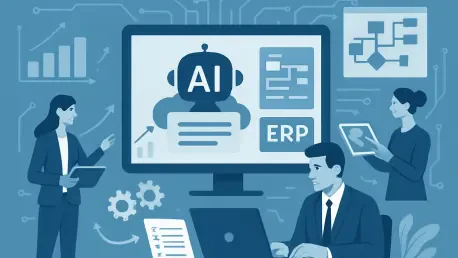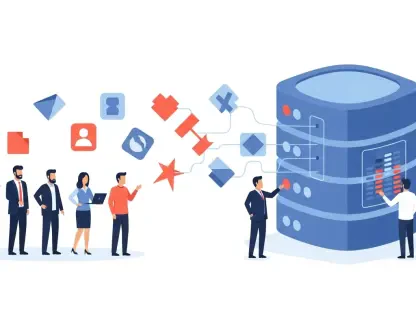The landscape of business technology is undergoing a seismic shift as Artificial Intelligence (AI) integrates deeply with Enterprise Resource Planning (ERP) systems, fundamentally redefining how organizations manage their core operations. For decades, ERP platforms have served as the central hub for critical functions like finance, supply chain, and human resources, ensuring data consistency and operational flow. However, the advent of AI technologies, including generative AI and intelligent assistants, is elevating these systems beyond mere data repositories into dynamic tools for efficiency and insight. This transformation is not a distant promise but a present reality, with companies already witnessing significant improvements in productivity and decision-making. As AI continues to reshape ERP, it’s clear that this synergy is unlocking untapped potential, allowing businesses to operate smarter and stay ahead in a competitive environment.
Unleashing Efficiency Through Automation
The most immediate and tangible benefit of AI in ERP systems lies in its ability to automate repetitive, time-consuming tasks that have long burdened employees across departments. Processes such as data entry, invoice processing, and financial reconciliations, which once demanded hours of manual effort, are now handled seamlessly by AI algorithms with remarkable accuracy. This shift is evident in real-world applications where AI tools draft comprehensive financial summaries from complex datasets in platforms like NetSuite, slashing processing times dramatically. Beyond saving time, automation reduces human error, ensuring consistency in critical operations. Finance teams, for instance, can now bypass the grind of month-end close activities as AI matches transactions and detects discrepancies autonomously, allowing staff to pivot toward more value-driven tasks like strategic planning and analysis. This level of efficiency isn’t just a convenience; it’s a competitive edge for businesses aiming to optimize resources.
Delving deeper into automation, AI’s capabilities extend to more intricate workflows that require precision and attention to detail. Consider the scrutiny of supplier invoices against purchase orders—AI can identify mismatches or anomalies at a granular level, far surpassing human capacity for speed and accuracy. This functionality is transforming procurement and accounts payable departments, where errors or delays can have cascading effects on cash flow and vendor relationships. Additionally, AI tools are being deployed to flag irregularities in financial records, acting as a first line of defense against potential fraud or oversight. Such advancements mean that ERP systems are no longer passive storage units but active guardians of data integrity. Businesses can trust these platforms to maintain operational accuracy without constant human intervention, freeing up teams to focus on innovation and growth rather than mundane error-checking.
Empowering Decisions with Predictive Analytics
AI’s integration into ERP systems is also revolutionizing how businesses approach decision-making, thanks to powerful predictive analytics capabilities. By sifting through vast amounts of historical and real-time data, AI provides forecasts that help organizations anticipate market trends, supply chain disruptions, and inventory needs with unprecedented precision. This isn’t just about guessing future outcomes; it’s about offering actionable insights that enable proactive responses. For example, in procurement, AI can recommend optimal purchasing strategies based on past patterns and current market conditions, ensuring cost efficiency. Similarly, supply chain managers benefit from alerts on potential bottlenecks before they escalate, allowing for swift contingency planning. This predictive edge transforms ERP from a reactive tool into a forward-thinking advisor, equipping companies to navigate uncertainties with confidence.
Beyond forecasting, AI enhances decision-making by embedding intelligent workflows directly into ERP platforms, making complex choices more manageable. Embedded AI assistants, often referred to as copilots, guide users through intricate processes by suggesting next steps or highlighting critical data points in real time. This is particularly valuable in scenarios like budget planning or resource allocation, where multiple variables must be weighed simultaneously. Unlike traditional ERP systems that merely present raw data, AI-driven platforms interpret information and offer tailored recommendations, adapting as new data emerges. This dynamic support system ensures that decisions are not only informed but also timely, reducing the risk of costly delays. As businesses face increasingly volatile markets, the ability of AI-enhanced ERP to turn data into strategic guidance is becoming a cornerstone of operational resilience and long-term success.
Redefining User Interaction with Intuitive Interfaces
One of the most striking changes brought by AI to ERP systems is the overhaul of user experience through natural language interfaces and intelligent assistants. Gone are the days of navigating cumbersome menus or wrestling with rigid reporting tools; now, users can interact with ERP platforms conversationally, as if speaking to a colleague. AI assistants like Microsoft Copilot enable employees to request data summaries, generate reports, or even draft customer communications simply by typing or speaking plain-language queries. This accessibility breaks down barriers for non-technical staff, ensuring that insights are available to all levels of an organization. A marketing manager, for instance, can quickly pull together a sales performance narrative for a board meeting without needing to master complex software, making data a shared asset rather than a specialized skill.
Further enhancing this transformation, AI streamlines the creation and sharing of information in ways that save time and boost collaboration. Dynamic dashboards powered by AI provide instant summarizations and actionable suggestions, eliminating the delays associated with manual report generation. This means stakeholders can access real-time insights without waiting for IT teams to process requests, fostering quicker decision cycles. Additionally, AI can tailor outputs to specific audiences, whether it’s a detailed financial deck for executives or a simplified update for clients, ensuring relevance and clarity. This shift toward intuitive, user-centric design is redefining ERP as a tool that adapts to people rather than forcing them to adapt to it. As a result, organizations see improved engagement with their systems, driving higher adoption rates and maximizing the value of their technology investments.
Elevating ERP to a Strategic Asset
AI is fundamentally altering the role of ERP systems, pushing them beyond their traditional function as systems of record to become true systems of intelligence with strategic importance. No longer confined to storing transactional data, modern ERP platforms infused with AI actively drive business outcomes by uncovering patterns and suggesting optimizations. Research highlights that companies adopting these enhanced systems report stronger returns on investment and better operating margins, as AI automates inefficiencies and surfaces growth opportunities. For instance, an ERP system might analyze sales data to recommend cross-selling strategies, directly impacting revenue. This evolution positions ERP as a central pillar of competitive advantage, enabling firms to align operations with broader business goals and respond swiftly to market shifts.
Moreover, the strategic value of AI-driven ERP lies in its adaptability to diverse organizational needs, paving the way for customized solutions. As AI agents become more specialized, they can handle niche tasks like sales variance analysis or procurement risk assessment with tailored precision. This modularity allows businesses to scale their ERP capabilities in line with specific challenges, avoiding the one-size-fits-all limitations of older systems. Such flexibility is crucial in today’s fast-paced environment, where agility often determines success. By transforming ERP into a proactive, insight-rich platform, AI ensures that these systems are not just operational necessities but vital tools for innovation. Companies that leverage this potential stand to gain a significant edge, as their ERP becomes a partner in shaping future growth rather than merely documenting past performance.
Debating the Pace of Transformation
The integration of AI into ERP systems has sparked a lively discussion among industry experts about whether this shift represents a revolutionary leap or a more gradual evolution. On one side, many leaders argue that the rapid deployment of AI, with measurable productivity gains already evident in production environments, signals a profound overhaul of traditional ERP. They point to the speed at which major vendors are embedding generative AI into platforms, delivering immediate benefits like reduced manual workloads by significant percentages. This perspective sees AI as fundamentally changing the essence of ERP, turning it into a proactive system that anticipates needs and drives efficiency at scale. The momentum of these advancements suggests a transformative wave that’s reshaping enterprise technology faster than anticipated.
Conversely, another school of thought frames AI’s impact as a steady, structural enhancement rather than a complete reinvention. Some experts emphasize that AI is addressing specific inefficiencies—such as lengthy audit processes or repetitive summary tasks—without displacing the core purpose of ERP as a reliable source of truth. They argue that while AI improves workflows and user interactions, it builds on existing foundations rather than tearing them down. This view highlights practical, incremental gains, like easing the burden of manual data patchwork, as evidence of an evolutionary path. Despite differing opinions on the speed and scope of change, there’s consensus that AI is making ERP indispensable, enhancing its relevance in a digital-first business landscape where adaptability and intelligence are paramount.
Looking Ahead: Shaping the Future of ERP
Reflecting on the journey, the fusion of AI with ERP systems marked a turning point in how enterprises managed their operations, blending automation with deep insights to create unprecedented efficiency. Companies that embraced this technology witnessed tangible gains, from streamlined financial processes to smarter supply chain strategies, setting a new standard for performance. The debate over whether this was a revolution or evolution became less significant than the undeniable impact on productivity and competitiveness that unfolded across industries.
Moving forward, businesses should focus on integrating AI seamlessly into their ERP ecosystems, ensuring systems remain modular and open to future innovations. Prioritizing vendor partnerships that offer scalable AI solutions will be key to staying ahead. Additionally, investing in user training to maximize the benefits of intuitive interfaces can drive broader adoption. As the landscape continues to evolve, staying agile and leveraging AI-driven insights will position organizations to not only adapt but thrive in an increasingly complex market.









